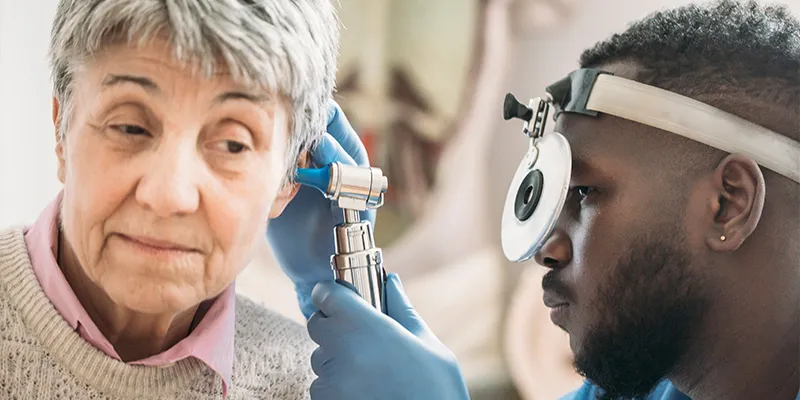You must have heard of the word eardrum. Well, there is no drum-like thing inside your ears that’s making music. The word is just a poetic way to describe a thin tissue inside your ear which in medical terms is known as the tympanic membrane.
What is a tympanic membrane? It separates your outer ear from the middle ear. (Our ear has three areas, outer, middle, and inner). When a sound wave reaches the tympanic membrane, it vibrates, and these vibrations then travel to the small bones of the middle ear, from where they are pushed into the inner ear. These vibrations are what become nerve impulses that our brain hears as sound.
Sometimes, this thin, tissue-like membrane can tear or develop a hole. When this happens, naturally, it can impact your hearing.
Why does the eardrum tear?
There are many reasons.
- A common cause for eardrum rupture is small, sharp objects that get lodged in your ear, like when you wrongly clean your ear with a pointed end of a pencil. Or push a cotton swab into your ear sharply.
- Some ear infections can also cause the eardrum to rupture. For example, a middle ear infection usually leads to the build-up of fluid inside the area, and the pressure from the fluid damages the eardrum.
- Another cause for eardrum rupture is air pressure. Can you recall a time when you were in an airplane and the air pressure suddenly changed? This change in pressure puts tremendous stress on the ear and can lead to a torn eardrum. This condition is known as barotrauma.
- Scuba diving, being hit by shock waves, and driving at high altitudes can also cause pressure on the ears to drastically change and lead to eardrum damage.
- Specific impacts to the ear, such as a direct blow, severe slap, head injury or fall that involves your ear, can also affect the eardrum through dislocation of the ear areas.
- And here’s a point to consider: Loud sounds or explosions do not always lead to eardrum rupture.
What happens when the eardrum ruptures?
- First, your hearing is impaired. Some people may not lose hearing entirely, but they feel like something is not right in their ears or head; there is a distinct discomfort.
- Second, your ear is less protected, and you may get infections. You see, your eardrum also acts as a guard for your middle ear by preventing bacteria, water, and other external elements from entering. So, if it is ruptured, your middle ear is more vulnerable to infections.
Also, the grime in our ears is usually confined to the outer ear, which we clean with earbuds or wash in our daily shower. But if your eardrum is ruptured and you do not attend to it, the ear grime can move down to your middle ear, possibly causing infection.
Can a torn eardrum be repaired?
Usually, a torn eardrum heals within a few weeks. But sometimes, you may have to undergo minor surgery, and get a patch, to get it sorted.
How do I know my eardrum is torn?
You may experience the following symptoms:
- Loss of hearing.
- Ringing sensation in your ear.
- Dizziness.
- Ear pain. It can come and go, can be severe or mild.
- Fluid from your ear, like mucus or pus-like secretion.
When should I see a doctor?
If you are experiencing any of the above systems, do not delay your visit to the doctor. Your middle and inner ears are delicate structures that are sensitive to injury or disease.
The ENT doctor uses an instrument called an otoscope to examine your ear. The device has a light at one end. The doctor shines it into your ear to check for a hole or tear in the eardrum. The doctor may also do a test to assess your hearing loss. You may be prescribed medicines to control the pain.
Precautions to take while your eardrum is healing:
- Keep your ears dry. Use a shower cap or protective covering while bathing to ensure no water enters your ear.
- Try not to blow your nose while your ear is healing.
- Take the prescription medicines as advised by the doctor.
- Avoid cold ear blowing into your ear.
Good hygiene and ear-friendly practices:
- Do not insert sharp objects into your ears for cleaning. Always use quality earbuds and gently clean your outer ears only. This way, you will not run the risk of accidentally damaging your eardrum.
- When you have a cold or a nasal block, do not indulge in high-altitude diving, scuba diving, or catching a plane. Wait for the condition to normalize. These activities put extra strain on your ears, and you may end up damaging your eardrum.
- Try to use pressure balancing earplugs when flying, particularly during take-off and landing when cabin pressure changes.
- Stay away from loud concerts and other high-decibel events that create powerful sound waves. These can damage your ears.
- Do not neglect signs of earache, ear infection, fever, and hearing problems. Get expert advice immediately.
